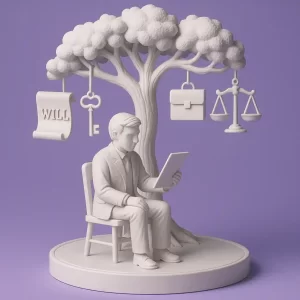 What Is an Executor?
What Is an Executor?
An executor is the person (or people) named in a will to carry out the instructions set out in that document after someone dies. This includes applying for probate (the legal authority to deal with the deceased’s estate), gathering in assets, settling debts and taxes, and distributing the estate to beneficiaries.
Executors may be family members, friends, professionals, or a combination of these. While many people accept the role without hesitation, they often underestimate the extent of their duties, and the fact that they can be held personally liable for any errors or oversights.
Key Legal Responsibilities
In England and Wales, the role of executor is governed by various statutes, including the Administration of Estates Act 1925 and the Trustee Act 2000. Key duties include:
– Registering the death and locating the will
– Applying for a grant of probate
– Identifying and valuing all assets and liabilities
– Paying Inheritance Tax (IHT), if due, within six months of the date of death
– Collecting in assets and settling debts
– Preparing estate accounts
– Distributing the estate according to the will
This process often takes months and, in more complex estates, over a year. Executors must act in accordance with the law, exercise reasonable care and skill, and avoid conflicts of interest.
The Risks Involved
Being an executor is not simply a matter of paperwork. It is a fiduciary role that carries legal obligations. Missteps can result in financial loss, family disputes, or even court proceedings. The main risks include:
Personal Liability for Mistakes
Executors can be personally liable for any financial loss resulting from errors, even if unintentional. For example, distributing the estate before settling all debts can leave the executor responsible for paying the shortfall.
Family Disputes and Emotional Strain
Family dynamics are often strained after a death. Executors who are also beneficiaries may find themselves at the centre of disagreements, especially where the will is contested or perceived as unfair.
Financial Risks and Tax Exposure
Failing to correctly calculate and pay IHT, Capital Gains Tax or Income Tax can lead to penalties and interest. Executors must also be aware of deadlines and HMRC compliance, particularly in estates involving property or business assets.
Delays and Administrative Pressure
Even a straightforward estate involves a significant volume of documentation, correspondence, and financial tracking. Executors who are also working, caring for family, or grieving, may find this overwhelming.
When You’re Personally Liable
Many people are unaware that an executor’s liability can be is personal. This means if something goes wrong, the executor—not the estate—can be pursued for losses. Situations where liability commonly arises include:
– Distributing assets too early
– Missing or undervaluing assets
– Failing to advertise for creditors (Section 27 Trustee Act 1925)
– Paying beneficiaries without first settling all tax liabilities
– Making errors in estate accounts or misinterpreting the terms of the will
Even a small oversight can result in legal action, especially in high-value or contentious estates.
How a Solicitor Can Help
Solicitors with expertise in wills and probate can make the process clearer, safer, and less stressful. Whether assisting executors with specific tasks or managing the entire administration, a probate solicitor adds legal certainty and practical efficiency.
Providing Clarity on Duties
At the outset, a solicitor can explain the executor’s responsibilities in plain language and help assess the complexity of the estate. They can confirm whether probate is needed and what steps to take immediately after the death.
Handling Paperwork and Deadlines
Probate involves a large amount of paperwork, including grant application paperwork, to HMRC IHT accounts, bank notifications and Land Registry updates. A solicitor ensures these are completed correctly and on time, avoiding delays and penalties.
Dealing with HMRC and Creditors
Calculating and reporting IHT is one of the most complex parts of the process. Solicitors can liaise with HMRC, ensure reliefs and exemptions are properly applied, and handle any follow-up queries. They can also carry out Section 27 notices to protect the executor from unknown debts.
Preventing or Resolving Disputes
Where there is tension between beneficiaries, or doubts about the validity of the will, a solicitor can act as a neutral adviser, reduce the risk of misunderstandings, and help resolve disagreements before they escalate.
Appointing a Professional Executor
In some cases, it may be preferable to appoint a solicitor or law firm as the executor itself. This is particularly useful where:
– The estate is complex or high-value
– There are business assets or trusts involved
– There are no suitable family members or friends available
– Family dynamics are difficult or contentious
A professional executor brings legal expertise and impartiality, and can avoid burdening loved ones at a difficult time.
How to Get Help from a Probate Solicitor
If you’ve been named as an executor and are unsure about any aspect of the role, it is worth seeking legal advice early on. Most probate solicitors offer an initial consultation, and you can decide whether to:
– Instruct the solicitor to carry out the entire administration (known as a ‘full estate administration service’)
– Ask for help only with the probate application or tax forms
– Use the solicitor as a sounding board for specific queries as they arise
The cost of legal advice can usually be paid from the estate, not from the executor’s own funds.
Conclusion
Acting as an executor is a responsible role with real legal and financial implications. While many estates are managed without issue, the risks should not be underestimated. Personal liability, administrative burdens, and potential conflicts make it vital for executors to understand their duties and seek support where needed.
WILLS, TRUSTS & PROBATE
When it’s time to put your financial and family affairs in order, our Wills, Trusts and Probate specialists have the expertise to ensure that your wishes and needs are well taken care of:
- Wills and reviews of existing wills
- Powers of Attorney
- Probate and Estates Administration
- Court of Protection
- Trusts
- Planning for later life
Partner Hugh Harries heads the department, working alongside fellow partner Mark Lynham and experienced solicitors Andrew Hart and Laura Lyes and former partner Alexis Cassin, now a consultant.
To contact one of our specialists, call 01242 514674 or click here
At Midwinters, we provide clear, expert advice on all aspects of probate and estate administration. Whether you need a one-off consultation or full support throughout the process, our solicitors are here to help.
If you’ve been named as an executor, or are planning your own will and thinking about who to appoint, contact our Wills, Trusts and Probate team today.





